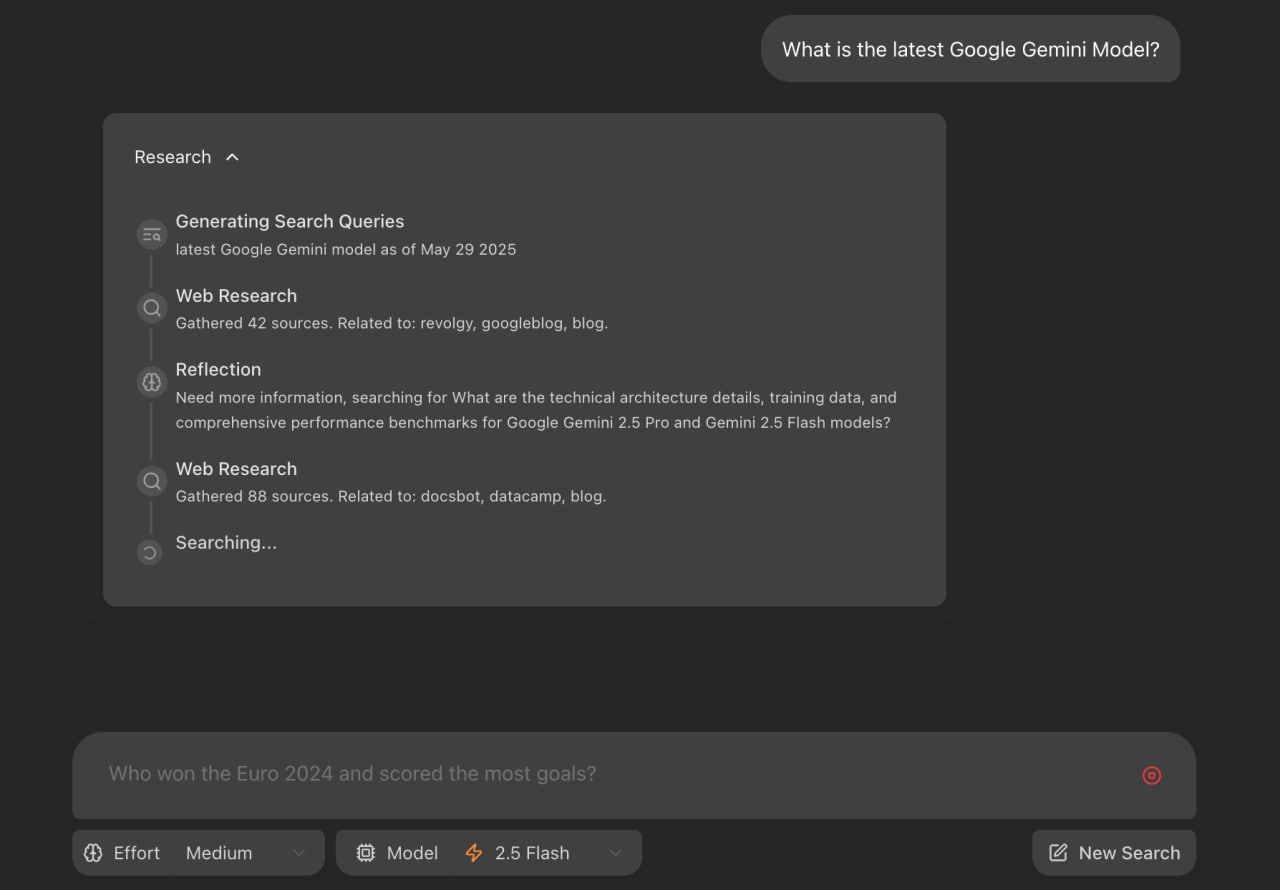In a surprise move on June 8, 2025, at 01:24 PM +0545, Google has made its DeepSearch agent openly accessible, unveiling a powerful tool that could transform how we conduct research online. Available at Github, this agent scours the internet step by step, analyzes the information, and compiles it into detailed, actionable reports. With a React-based front-end and a LangGraph-powered back-end, this open-source project invites developers and researchers to explore its potential—though its sudden release raises questions about Google’s intentions. Let’s dive into what this means and how you can get started.

Table of contents
Open Table of contents
What Makes DeepSearch Tick?
DeepSearch isn’t just a search engine—it’s an intelligent agent designed to mimic a human researcher’s process. It starts by dynamically generating search queries based on your input, uses the Gemini API to fetch web data, and then reflects on the results to identify knowledge gaps. This iterative approach ensures a thorough analysis, culminating in a report complete with citations for transparency. The front-end, built with React, provides an intuitive interface, while the LangGraph back-end handles the complex orchestration of these steps, making it a full-stack solution that’s both powerful and adaptable.
The project leverages Google’s Gemini models for reasoning and query generation, paired with LangGraph’s graph-based framework for structured workflows. This combination allows it to break down complex topics into manageable steps, a feature that’s been quietly refined in Google’s labs before this unexpected open-source drop. However, the lack of prior announcement or detailed rollout plans might suggest a rush to release—perhaps to counter competitors or test community feedback under the radar.
Getting Started: What You’ll Need
To launch DeepSearch locally, you’ll need a few key components:
- Gemini API Key: Available for free at AI Studio, this unlocks the AI’s research capabilities. Google’s decision to offer this for free aligns with its push to democratize AI, though it might also be a strategy to hook users into its ecosystem.
- LangSmith API Key: Obtainable at here, this is required for observability and debugging, ensuring you can trace the agent’s steps and refine its performance.
The setup involves running a Docker Compose configuration or separate development servers for the front-end (http://localhost:5173) and back-end (http://localhost:2024 or 8123), as outlined in the project’s documentation. This hands-on approach is a boon for developers but might intimidate casual users, hinting at a target audience of tech-savvy experimenters rather than the general public.
Implications and Questions to Ponder
Google’s decision to open-source DeepSearch is a bold move, especially given the competitive landscape of AI research tools like Perplexity’s Deep Research or xAI’s Grok. It could accelerate innovation by letting the community enhance the tool, but the establishment narrative—painting this as a selfless act of openness—deserves scrutiny. Is this a genuine gift to developers, or a strategic play to gather data on usage patterns and refine Google’s proprietary AI offerings? The project’s reliance on the Gemini API, which ties it to Google’s infrastructure, suggests the latter might be at play.
The agent’s ability to produce detailed, cited reports is impressive, potentially saving hours of manual research. Yet, its effectiveness hinges on the quality of web data it accesses, which can be a mixed bag in today’s polarized internet. Some might also question the privacy implications of processing queries through Google’s API, even if the code runs locally. As an alpha-stage tool, expect quirks—early adopters on platforms like X have praised its potential but noted occasional gaps in reasoning that need human oversight.
A New Tool for the Curious
DeepSearch’s open access marks a significant moment for AI-driven research, offering a glimpse into Google’s cutting-edge work while inviting collaboration. Whether you’re a developer looking to customize its logic or a researcher eager to automate literature reviews, this tool opens doors—provided you’re willing to navigate its setup and limitations. Grab your Gemini and LangSmith API keys, head to https://github.com/google-gemini/gemini-fullstack-langgraph-quickstart, and start exploring. This unexpected drop might just be the spark for the next big breakthrough in AI research—but keep an eye on the fine print as you dive in!
Comments
Comments are powered by Facebook. By using this feature, you agree to Facebook's Cookie Policy and Privacy Policy.